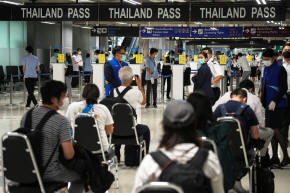Thailand eases entry rules for tourists, scraps mask policy
 Send a link to a friend
Send a link to a friend
 [June 17, 2022]
BANGKOK (Reuters) - Thailand
announced on Friday it would abandon its much-criticised
pre-registration process for foreign visitors and no longer require face
masks to be worn in public, responding to a slower COVID-19 spread. [June 17, 2022]
BANGKOK (Reuters) - Thailand
announced on Friday it would abandon its much-criticised
pre-registration process for foreign visitors and no longer require face
masks to be worn in public, responding to a slower COVID-19 spread.
The "Thailand Pass" system, where foreign tourists must seek prior
approval from Thai authorities, will be halted from July 1, Tourism
Minister Pipat Ratchakitprakan told reporters, removing one of the
country's last remaining travel curbs.
Thailand is one of the world's most popular travel destinations, but
tourism businesses have long complained its requirement for foreigners
to submit multiple documents - from vaccine and swab test certificates
to medical insurance and hotel bookings - was impeding the sector's
recovery.
Thailand was visited by nearly 40 million people in 2019, but received
less than 1% of that number last year, despite easing its quarantine
requirements.
Though tourism has picked up in recent months, the industry is far from
recovering, with huge jobs and businesses losses in a sector that
typically accounts for about 12% of Thai gross domestic product.
[to top of second column]
|

Foreign tourists prepare their documents at the new entry lanes at
Suvarnabhumi Airport during the first day of the country's reopening
campaign, part of the government's plan to jump start the
pandemic-hit tourism sector in Bangkok, Thailand November 1, 2021.
REUTERS/Athit Perawongmetha/File Photo
 The coronavirus task force on Friday
also said use of face masks would from next month be voluntary, but
advised people to wear them if in crowded settings or if suffering
from health conditions.
Thailand has suffered more than 30,000 COVID-19 deaths overall, but
has largely contained its outbreaks, helped by a vaccination rate of
more than 80%.
(Reporting by Panarat Thepgumpanat; Writing by Martin Petty; Editing
by Ed Davies)
[© 2022 Thomson Reuters. All rights
reserved.] This material may not be published,
broadcast, rewritten or redistributed.
Thompson Reuters is solely responsible for this content. |